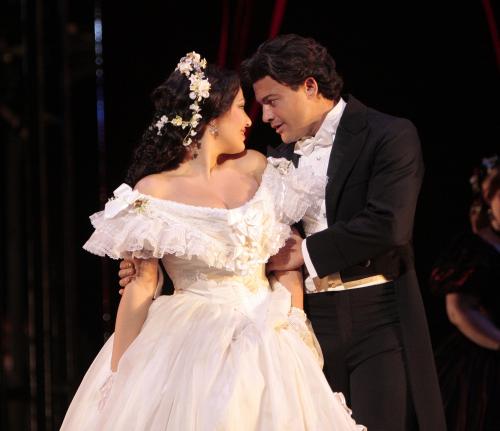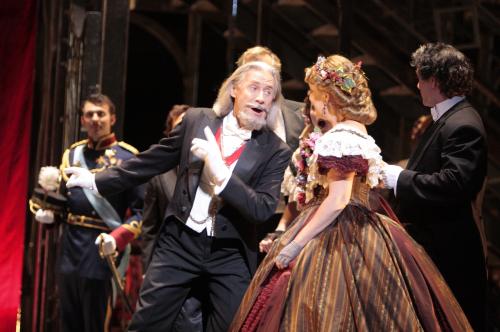LA Opera’s Roméo Knows How to Make the Moves.

Nino Machaidze & Vittorio Grigolo, Photo: Robert Millard
CHARLES GOUNOD
‘ROMÉO ET JULIETTE’
LOS ANGELES OPERA
DOROTHY CHANDLER PAVILION
SEEN NOVEMBER 12, 2011
By Carol Jean Delmar
Opera Theater Ink
LA Opera has a winner with its reproduction of Charles Gounod’s “Roméo et Juliette.” The production itself is visually beautiful; the singing is commendable; and the Roméo is stupendous.
Six years ago Rolando Villazón and Anna Netrebko dazzled LA audiences with Shakespeare’s romantic story of the two lovebirds whose feuding families made their match made in heaven, a match made in hell. Juliette took a sleeping potion. Roméo thought she was dead so he took poison. When he realized that she was alive, it was too late for him, so Juliette stabbed herself to remain with him forever.
Villazón has been plagued with vocal problems which have hampered his career. It seems that Vittorio Grigolo could be his replacement. What has made Villazón so unique is that he sounds great when not indisposed; he looks like a Greek God; and he moves and acts like a matinée idol. But if an opera singer misses too many performances, there are many young tenors who are waiting in the wings. But are there, really? Well, technically, yes. However tenors with all of Villazón’s talents are rare. But now there is Vittorio Grigolo whose exuberance makes Rolando Villazón look like Grandma Moses. I have never seen an opera singer move as effortlessly as Grigolo. If he weren’t blessed with a such beautiful voice, I would say that he should audition for Cirque du Soleil.
Grigolo is good-looking, charismatic, and his sound also has a tearful quality which is so vital to a star tenor’s timbre. Although not as hefty as some voices, his lyric tenor resonates focused forward sound, and on Nov. 12, his “Ah! leve-toi soleil” showed us that he has the goods. His youthful spirit makes him the ideal Roméo, and we couldn’t help but smile when he almost exploded with delight upon discovering that Juliette had feelings for him.
Another wonderful component of this production is precisely the production itself, specifically the airy set with moveable ladders and scaffolding, and the wonderfully lush period costuming.
Nino Machaidze as Juliette was admirable but seemed years older than her Roméo. At times she tried to mirror his childlike exuberance, but her older sultry quality prevailed, which wasn’t all that bad since “sultry” often brings out the virility in a male like Roméo. Her voice was far more mellow after intermission than before. I wanted to hear more beauty in it, though. Her high notes didn’t always quite land where they should have, and they sometimes sounded less than pleasing. But her “Je veux vivre” was charming, and overall, she was an excellent Juliette.
Vladimir Chernov as Lord Capulet was a marvel. He truly made the most of his supporting role, turning it into a standout performance, not only because he sang with a chocolaty baritone, but because when he entered onstage, he at once became a major presence. He stood tall and secure, and he moved majestically. His acting caught our attention because he created a character, yet he didn’t overwhelm us or overpower the others onstage. He was truly a distinguished Capulet vocally and visually.
Mezzo-soprano Ronnita Nicole Miller (the Nurse) displayed a rare richness and depth of tone. Vitalij Kowaljow was a sonorous Friar Laurence. Alexey Sayapin (Tybalt), Museop Kim (Mercutio), Renée Rapier (Stephano), Daniel Armstrong (Count Paris), Philip Cokorinos (the Duke of Verona), and Michael Dean (Gregorio) rounded out the cast. The fight scene was choreographed meticulously.
I send my compliments to director Ian Judge for enabling the singers to act and move far beyond my expectations. I compliment John Gunter and Tim Goodchild for their appealing sets and costumes. And I commend Plácido Domingo for his steady orchestral leadership in the pit.
This is the kind of production that elevates LA Opera. All of Los Angeles should see it.
Libretto: Jules Barbier and Michel Carré
Conductor: Plácido Domingo
Director: Ian Judge
Scenic Designer: John Gunter
Costume Designer: Tim Goodchild
Lighting Designer: Nigel Levings
Choreographer: Kitty McNamee
Fight Choreographer: Ed Douglas
Associate Conductor-Chorus Master: Grant Gershon

Vladimir Chernov as Capulet. Photo: Robert Millard.